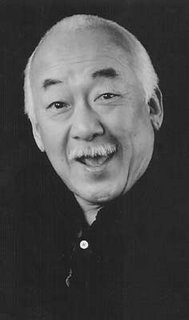
When I was a kid (in the late 70s, if you must know), there weren't many many Asians on TV. David Suzuki, Jack Soo on Barney Miller, and the token-of-the-week on M*A*S*H or Hawaii-Five-O. And then there was Arnold. No, not the Governator. Arnold as in Richie, Potsie, and the Fonz.
Last week Pat Morita passed away. Here's a tribute from the New York Times.
- Jovanni
Goodbye to Pat Morita, Best Supporting Asian
by Lawrence Downes
Published in the New York Times: November 29, 2005
Pat Morita, the Japanese-American actor, died on Thanksgiving Day in Las Vegas. He was 73. News reports over the weekend were not specific about the cause of death or funeral details. Also not clear was what Hollywood would do now that Mr. Morita is gone.
The movie and TV industry has never had many roles for Asian-American men, and it seemed for a while that they all went to Mr. Morita. He made his debut as "Oriental No. 2" in "Thoroughly Modern Millie" in 1967 and never stopped working. He hit two peaks - as Arnold the diner owner on TV's "Happy Days" and the wise old Mr. Miyagi in the "Karate Kid" movies - and spent the rest of nearly 40 years roaming an endless forest of bit parts.
He was Mahi Mahi, the pidgin-talking cabby in "Honeymoon in Vegas," Lamont Sanford's friend Ah Chew in "Sanford and Son," Brian the waiter in "Spy Hard," Chin Li the Chinese herbalist in "The Karate Dog."
Whenever a script called for a little Asian guy to drive a taxi, serve drinks or utter wise aphorisms in amusingly broken English, you could count on Mr. Morita to be there.
Those who knew Mr. Morita say he was a man of uncommon decency and good humor. He fulfilled the actor's prime directive, to keep busy.
But it's distressing to think that the life's work of one of the best-known, hardest-working Asian-American actors is mostly a loose collection of servile supporting roles.
I know nothing about Mr. Morita's ambitions; if he had a longing to interpret Eugene O'Neill on Broadway, I have not heard of it. But actors generally have to work within the range of what's available. And with Asian-Americans, particularly men, what's available generally stinks.
Mr. Morita was one of the last survivors of a generation of Asian-American actors who toiled within a system that was interested only in the stock Asian. Harold Sakata played Oddjob in "Goldfinger" and was typecast as a mute brute forever after. Philip Ahn played houseboys and villains for decade upon decade.
Some actors - well, a couple - broke out, like George Takei, Mr. Sulu in "Star Trek," and Jack Soo on "Barney Miller." B. D. Wong's role on "Law & Order: Special Victims Unit" is a major improvement, but it will be a long, long time before we erase the memory of the bucktoothed, jabbering Mickey Rooney in "Breakfast at Tiffany's," or Sidney Toler as Charlie Chan.
Watch Rob Schneider play Ula, a leering Hawaiian in the Adam Sandler movie "50 First Dates," with a pidgin accent by way of Cheech and Chong, and you get the sense that Hollywood still believes that there is no ethnic caricature a white actor can't improve upon.
Mr. Morita, who was born Noriyuki Morita to migrant farmworkers in California and was sent to an internment camp in Arizona during World War II, never gave the sense of bearing a racial burden.
He had a comic's perspective and sense of humor, and would play his parts - Chinese, Japanese, Korean, whatever - with relaxed professionalism. As a standup comedian in the 1960's, he called himself "the Hip Nip," and he once told a group of Pearl Harbor survivors in a Waikiki nightclub that he was sorry about messing up their harbor.
Mr. Miyagi remains everybody's idea of a positive character. Who can forget "wax on, wax off," his wise counsel linking car care to karate? But still, it bother me Miyagi-san so wise, but find so hard use articles, pronouns when talk.
Mr. Morita's legacy may soon take a posthumous turn for the better. He has a role in an unreleased movie, "Only the Brave," about Japanese-American soldiers of the famed 442nd Regimental Combat Team, one of the most decorated units in World War II. He plays a Buddhist priest who is imprisoned in Hawaii after Pearl Harbor.
Lane Nishikawa, who wrote, directed, produced and acted in the film, which is now making the rounds of festivals in search of a distributor, said it told its story from the Asian-American point of view - an unusual perspective, by past or current standards.
With its wide pool of Asian-American talent, including Mr. Morita, Tamlyn Tomita and Jason Scott Lee, the film promises to be at least different from the other movie about the 442nd.
That one -"Go for Broke!" - was made in 1951 and starred Van Johnson, with a large, and utterly forgotten, supporting cast.



No comments:
Post a Comment